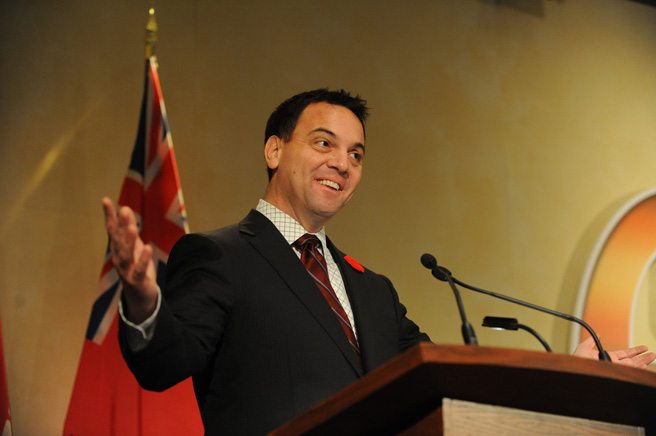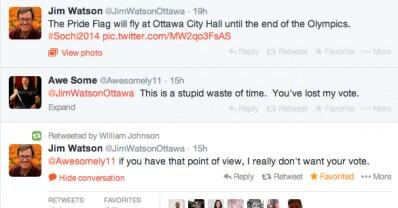
Very true, this. People have a habit of believing that which validates pre-existing beliefs. If you believe the Bible is literal truth, for instance, you're going to look for facts that prove you right and question those that don't.
If you believe in or against global warming, it's a simple matter to cherry-pick arguments that support you and refute any criticism as bogus science. If gay people, Jewish people or Africans make you feel uncomfortable, you can find all sorts of evidence to validate those feelings - especially when you hold doggedly to your starting premise.
Which is the thing about science; science is study, not validation. The whole point is to develop and challenge starting premises, rejecting those that don't fit. That's how it came to be that religious men like Charlies Darwin or Copernicus found themselves forced to question certain premises of their faith told them were unquestionable and challenge the status quo.
They weren't intentionally being rebellious; they were simply following the evidence.

How do we know a person is sick? There's no label that pops up on the skin with a written description of an ailment, but there are symptoms that can be readily identified and, thanks to a massive body of study, attributed with general accuracy to specific illnesses or afflictions. This is called diagnosis.
Where does the illness come from? Can it be cured? Does it pose a risk to others? Before we had scientifically researched diagnosis systems, people relied a lot on assumptions. These assumptions were believed to be gospel for the simple reason that
if it was true before, it must surely be true now.
We have historically tended to err on the side of reactive caution on this front - lepers were sent away to colonies and supposed witches were burned at the stake. Infidels and barbarians have been kept outside the kingdom with firewalls of various compositions.
The same holds true for economic prescriptions; if an economy has lost its luster, as ours has now, use common sense - shrink government, cut taxes, reduce organized labour supports and allow companies to produce the same goods at a lower cost so as to compete with other jurisdictions that produce goods at low cost, like Bangladesh.
The same equally holds true for crime - tougher punishment, greater restrictions and longer sentences are the way to go. In this sense, prisons serve the same purpose as leper colonies or insane asylums of old.
This sort of approach doesn't follow the evidence and revisit original assumptions - it relies on traditional wisdom and gut instinct. If you know the Bible is the literal truth, then anything that refutes it is wrong. If you know that the world fits into neat categories of good and evil, with tradition, the free market and individual independence firmly in the good column and progress, centrally coordinated social service and government in the evil column, your choices are pretty easy, aren't they?
Which brings us back to health.

Really think about it for a second - traditionalists of any kind work very hard to present the threats of opposing ideologies as almost virus-like in nature, with the faith, leader or belief system the only tonic to protect against this threat. As such, they hammer home their message as often, as loudly and as pervasively as they can. At the same time, they try to reduce the flow of contrarian information.
This quarantining against challenging information generally involves creating closed communities and either excommunicating or locking away challengers, as well as the removal of contradictory information. This last, in its most extreme form looks like book burnings; in its more subtle manifestations, it looks like killing the census,
closing libraries and generally staunching the flow of data to the people.
When time was, people didn't have a lot of access to information; we didn't know about germ theory, principles of physics, meteorology, metallurgy, etc. Like other animals out there, we had nothing but instinct to go on - until we learned to be curious.
Through curiosity, we began to question, to experiment, to make mistakes and learn from them. One can only imagine that our distant ancestors thought of fire as an uncontrollable force of nature and looked at beast and plant as things that existed in an unchanging state. But we've learned to control fire and we've mastered the science of domestication, haven't we?
So too have we developed all the fields, specializations and organizational capacities that make human civilization possible.
None of this would have been possible if we hadn't learned to question - or better phrased,
developed the ability to question. Which is hard to do when individual survival is your every-day focus.
Through collaboration, we develop safe spaces and specialization. Collaboration requires proximity and trust, however, which means some common purpose and shared rules must be established. New challenges emerge that require further cooperation, specialization and innovation to solve. It goes on and on.
Back to healthcare again. Have you ever gone to the doctor's office and been given a prescription without an explanation as to what the activity or medication is actually going to accomplish? What
does the doctor tell you?
Have you ever wondered why cleansing rituals, particularly in relation to the consumption of food, are so common in religions, or do you assume it's just what God demands?

If you accept that God has a plan and that there are mysteries that are simply beyond the ken of man, there's no need to ask questions. Accept traditional wisdom and carry on. It's basically the same thing as letting the doctor tell you what to do without asking why - the next time something goes wrong, you'll be back to see the doctor again. And there's always the chance that the doctor is wrong.
Before there was germ theory, public healthcare and the welfare state, there were religious ablutions and the call for charity. "Love thy neighbour" was the first crack at diplomacy. Depending on your starting premise, you can look at a lot of the content of the Bible or any religious text as setting ground rules for good behaviour in a social context, much like a parent will tell their children to eat their vegetables and brush their teeth before that child comes to understand the value of doing these things.
With time, children learn the reason behind the rules and in some cases, recognize how certain regulations either were poorly formed or may be past their best-before date.
Good parents encourage their children to ask why, because for them the goal isn't to maintain constant mastery over their offspring but to provide a solid basis of personal growth and then encourage independence.
Some day, after all, it'll be up to those kids to prepare their own children for the world they will eventually live in.
Creationists and fundamentalists of any kind can defend the literal interpretation of their holy scriptures 'til kingdom come and insist that complete submission to the word of their deity is the only path to salvation.
I think they're starting with the wrong assumption.

Inquires that follow the evidence and challenge traditional thinking aren't blasphemy, undermining the written word of any divine figure. Living a prescribed lifestyle in unwavering fashion honours no father. The role of parents isn't to restrict their children but to empower them.
They can open the door, as it were - but it is always, always up to us to step through.
Luke 11:9
































